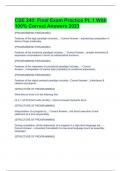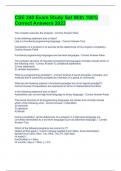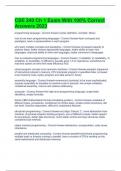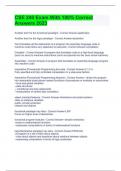Cse 240 - Study guides, Class notes & Summaries
Looking for the best study guides, study notes and summaries about Cse 240? On this page you'll find 72 study documents about Cse 240.
Page 4 out of 72 results
Sort by
CSE 240: Final Exam Practice Pt. 1 With 100% Correct Answers 2023
CSE 240 Exam Study Set With 100% Correct Answers 2023
CSE 240 Ch 1 Exam With 100% Correct Answers 2023
CSE 240 Exam With 100% Correct Answers 2023
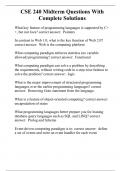
-
CSE 240 Midterm Questions With Complete Solutions
- Exam (elaborations) • 18 pages • 2023
-
Available in package deal
-
- $11.49
- + learn more
What key feature of programming languages is supported by C++, but not Java? correct answer: Pointers In contrast to Web 1.0, what is the key function of Web 2.0? correct answer: Web is the computing platform What computing paradigm enforces stateless (no variable allowed) programming? correct answer: Functional What computing paradigm can solve a problem by describing the requirements, without writing code in a step-wise fashion to solve the problem? correct answer: logic What i...
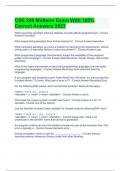
-
Package deal for CSE 240 Exam Questions with 100% Correct Answers | Verified
- Package deal • 24 items • 2023
-
- $46.99
- + learn more
CSE 240 Exam Questions with 100% Correct Answers | Verified CSE 240 Midterm Exam With 100% Correct Answers 2023 CSE 240 Midterm Study ASU Gonzales Questions And Answers 2023 CSE 240 Midterm Exam Questions With 100% Correct Answers 2023 CSE 240 Final Exam Review With 100% Correct Answers 2023 CSE 240 Selgrad Exam With 100% Correct Answers 2023
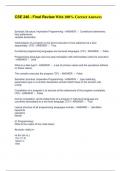
-
CSE 240 - Final Review With 100% Correct Answers
- Exam (elaborations) • 13 pages • 2024
- Available in package deal
-
- $9.79
- + learn more
Syntactic Structure: Imperative Programming - ANSWER - Conditional statements; loop statements; variable declaration Interpretation of a program is the direct execution of one statement at a time sequentially. (T/F) - ANSWER - True Functional programming languages are low-level languages. (T/F) - ANSWER - False Programming language uses two-step translation with intermediate codes for execution. - ANSWER - Java What is a data type? - ANSWER - a set of primary value...
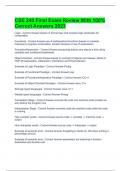
-
CSE 240 Final Exam Review With 100% Correct Answers 2023
- Exam (elaborations) • 3 pages • 2023
-
Available in package deal
-
- $10.99
- + learn more
CSE 240 Final Exam Review With 100% Correct Answers 2023 Logic - Correct Answer-based on formal logic and includes logic predicates for computation Functional - Correct Answer-use of mathematical functions (based on Lambda Calculus) to express computation, simpler because of use of expressions Procedural/Imperative - Correct Answer-processing actions one step at a time using variables and conditional statements Object Oriented - Correct Answer-based on concept of objects and classes, p...
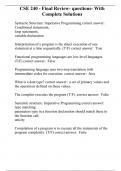
-
CSE 240 - Final Review- questions- With Complete Solutions
- Exam (elaborations) • 19 pages • 2023
-
Available in package deal
-
- $11.49
- + learn more
Syntactic Structure: Imperative Programming correct answer: Conditional statements; loop statements; variable declaration Interpretation of a program is the direct execution of one statement at a time sequentially. (T/F) correct answer: True Functional programming languages are low-level languages. (T/F) correct answer: False Programming language uses two-step translation with intermediate codes for execution. correct answer: Java What is a data type? correct answer: a set o...
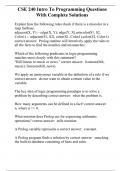
-
CSE 240 Intro To Programming Questions With Complete Solutions
- Exam (elaborations) • 21 pages • 2023
-
Available in package deal
-
- $12.99
- + learn more
Explain how the following rules check if there is a miscolor in a map factbase. adjacent(X, Y) :- edge(X, Y); edge(Y, X).miscolor(S1, S2, Color1) :- adjacent(S1, S2), color(S1, Color1),color(S2, Color1). correct answer: Prolog runtime will iteratively apply the rules to all the facts to find the matches and mismatches. Which of the following predicates in logic programming matches most closely with this statement? "Bill listens to music or news." correct answer: listensto(bill, music); ...

Study stress? For sellers on Stuvia, these are actually golden times. KA-CHING! Earn from your study resources too and start uploading now. Discover all about earning on Stuvia

